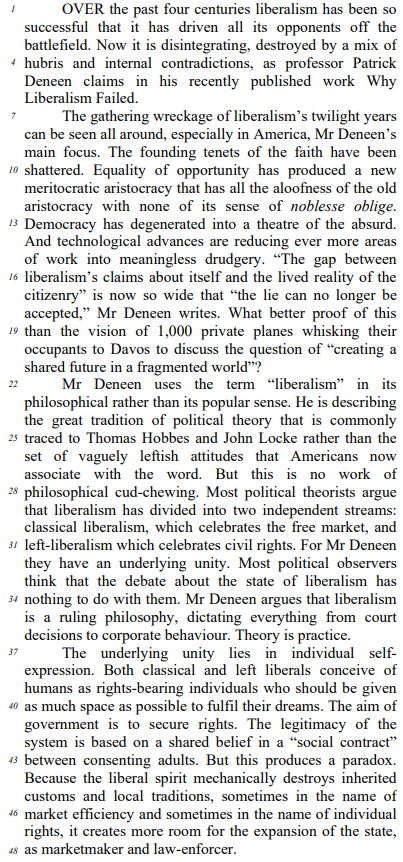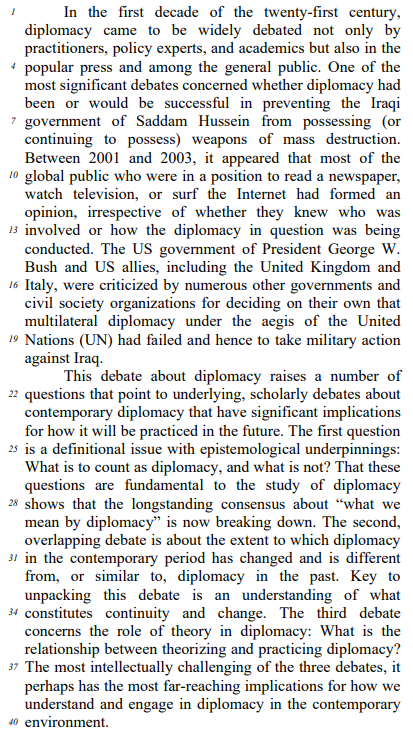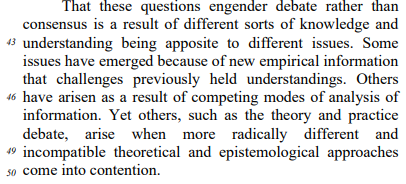Questões de Concurso Público Instituto Rio Branco 2023 para Terceiro-Secretário da Carreira Diplomata - Tarde
Foram encontradas 36 questões
Text to answer the question.

In: Political thought: the problem with liberalism.
The Economist, Edição impressa, p. 74, 27 jan. 2018.
The new meritocratic aristocracy’s distinguishing features are distancing or remoteness and a lack of moral and social responsibility.
Text to answer the question.

In: Political thought: the problem with liberalism.
The Economist, Edição impressa, p. 74, 27 jan. 2018.
Meritocratic aristocracy is a mere construct, a contradiction in terms and therefore does not exist.
Text to answer the question.

In: Political thought: the problem with liberalism.
The Economist, Edição impressa, p. 74, 27 jan. 2018.
Americans’ historical attachment to democratic values have prevented them from accepting the notion of an aristocracy, even if it has a democratic appearance.
Text to answer the question.

In: Political thought: the problem with liberalism.
The Economist, Edição impressa, p. 74, 27 jan. 2018.
The prevailing view Americans hold of liberalism has departed significantly from that the historical political theorists had.
Text to answer the question.

In: Political thought: the problem with liberalism.
The Economist, Edição impressa, p. 74, 27 jan. 2018.
Historically, liberal values have failed to reflect the actual political and social reality for they are based on falsehoods.
Text to answer the question.

In: Political thought: the problem with liberalism.
The Economist, Edição impressa, p. 74, 27 jan. 2018.
Mr Deneen’s book provides a long-term analysis of the liberal phenomenon.
Text to answer the question.

In: Political thought: the problem with liberalism.
The Economist, Edição impressa, p. 74, 27 jan. 2018.
An anti-religion movement swept across America and destroyed some people’s belief in their Christian principles.
Text to answer the question.

In: Political thought: the problem with liberalism.
The Economist, Edição impressa, p. 74, 27 jan. 2018.
From its inception liberalism could never live up to its promise of “creating a shared future in a fragmented world” (lines 20 and 21).
Text to answer the question.

In: Political thought: the problem with liberalism.
The Economist, Edição impressa, p. 74, 27 jan. 2018.
“Hubris” (line 4) means “unwillingness or incapacity to adapt or adjust”.
Text to answer the question.

In: Political thought: the problem with liberalism.
The Economist, Edição impressa, p. 74, 27 jan. 2018.
“Wreckage” (line 7) is synonymous with “speed”.
Text to answer the question.

In: Political thought: the problem with liberalism.
The Economist, Edição impressa, p. 74, 27 jan. 2018.
“Twilight” (line 7) can be correctly replaced with “a period of decline.”
Text to answer the question.

In: Political thought: the problem with liberalism.
The Economist, Edição impressa, p. 74, 27 jan. 2018.
“Drudgery” (line 15) means “boring, hard, routine work”.
Text to answer the question.

In: Political thought: the problem with liberalism.
The Economist, Edição impressa, p. 74, 27 jan. 2018.
As far as grammar is concerned, mark the statements below as right (C) or wrong (E).
The word “ever” (line 14) can be correctly replaced with
“increasingly”, in this particular context, without
effecting any change in the original meaning.
Text to answer the question.

In: Political thought: the problem with liberalism.
The Economist, Edição impressa, p. 74, 27 jan. 2018.
As far as grammar is concerned, mark the statements below as right (C) or wrong (E).
The suffix “-ish” in “leftish” (line 26) adds the notion of
“somewhat or tending to” to the adjective “left”.
Text to answer the question.

In: Political thought: the problem with liberalism.
The Economist, Edição impressa, p. 74, 27 jan. 2018.
As far as grammar is concerned, mark the statements below as right (C) or wrong (E).
The word “this” (line 18) refers to “lie” (line 17).
Text to answer the question.

In: Political thought: the problem with liberalism.
The Economist, Edição impressa, p. 74, 27 jan. 2018.
As far as grammar is concerned, mark the statements below as right (C) or wrong (E).
The referent of the word “them” (line 34) is “civil rights”
(line 31).


According to the author, the general public formed an opinion regarding the Iraqi situation having all the possible facts available.


The author argues that the debate around diplomacy stems from the need to create an epistemological framework.


“Under the aegis of” (line 18) is the same as to face strife.


In the second paragraph, the word “underpinnings” (line 25) means support, basis or basic structure.